Click on images to enlarge
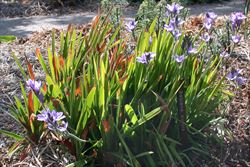
habit (Photo: Rob and Fiona Richardson)
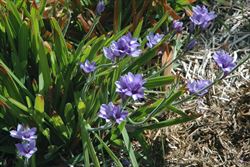
habit in flower (Photo: Rob and Fiona Richardson)

habit after flowering (Photo: Sheldon Navie)
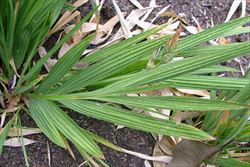
elongated, pleated, leaves (Photo: Sheldon Navie)

flower clusters (Photo: Rob and Fiona Richardson)
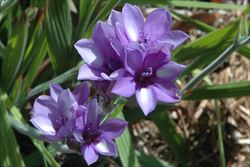
flowers (Photo: Rob and Fiona Richardson)
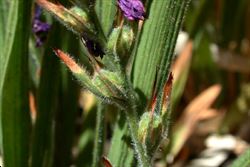
immature fruit (Photo: Rob and Fiona Richardson)
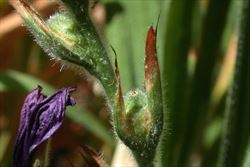
close-up of hairy stems and immature fruit (Photo: Rob and Fiona Richardson)
Scientific Name
Babiana angustifolia Sweet
Synonyms
Babiana disticha Ker Gawl. (misapplied)Babiana plicata (Thunb.) Ker Gawl. (misapplied)Babiana pulchra G.J. LewisBabiana stricta (Ait.) Ker Gawl. (misapplied)
Family
Iridaceae
Common Names
babiana, baboon flower, baboon lily, baboon-flower, upright babiana
Origin
This species is native to southern Africa (i.e. western Cape Province in South Africa).
Naturalised Distribution
This species is widely naturalised in the temperate regions of southern Australia (i.e. in south-western Western Australia and in some parts of Victoria). Naturalised populations of plants currently regarded as Babiana stricta in the south-eastern parts of South Australia and in the coastal districts of central and northern New South Wales are probably also baboon flower (Babiana angustifolia).
Notes
Baboon flower (Babiana angustifolia) is regarded as an environmental weed in Victoria, South Australia (i.e. as Babiana stricta) and Western Australia. It is widely cultivated as a garden plant in the temperate regions of Australia, and has spread from cultivation to form dense clumps along roadsides, in waste areas and in native bushland (e.g. eucalypt forests) and wetland areas.
This species is currently of most concern in Western Australia, where it is regarded as a serious weed in the Darling Ranges, the Avon Valley and the Swan Coastal Plain. In these regions it has invaded clay-based woodlands and wetlands, including remnant and threatened vegetation (e.g. a threatened coastal community in the Lambert Lane Nature Reserve and remnant native vegetation in the Kensington Bushland area in Victoria Park). It is also threatening one of the remaining natural populations of the critically endangered narrow-petalled featherflower (i.e. Verticordia plumosa var. pleiobotrya).

